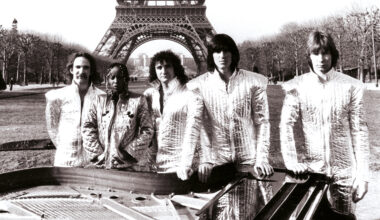They make music that is at once experimental, propulsive, foreboding and beautiful. They call it “rock concrète”. They love Baudelaire and Shakespeare as well as Suicide and Coil and Swans and Sonic Youth. They are Tomás and Carmen, originally from Argentina but now based in Berlin. Meet Mueran Humanos
Two Argentinians living in Berlin. They sing in Spanish, make music full of minor chords, and have a taste for avant-garde electronica, punk and industrial music like Coil, DAF and Suicide. They also make their own, sometimes disturbing images and videos. No wonder they think of themselves as outsiders.
And yet Berlin, a city of artists, thinkers and creators of many colours, seems to be an ideal home for the two dispossessed and saturnine musicians that call themselves Mueran Humanos. Tomás Nochteff (aged 36) and Carmen Burguess (33) settled here seven years ago, when they found there was more demand for Carmen’s art and for them to play live in the German capital – more so than in Barcelona, where they lived previously.
“Outsiders… it’s how we feel forever, since we were little kids,” says Tomás, who does all the talking for the pair. “We’re detached from mainstream culture, if you like. We are also detached from our country of origin and from the country we are living in. We are people who don’t fit.”
To my mind, this sense of uneasy alienation is very healthy for the creative psyche. It’s perhaps even essential. You only have to read Edward Said’s ‘Orientalism’ to realise that migrants and émigrés are responsible for some of the most profound artworks of the 20th century – with Polish-British author Joseph Conrad an early prime example.
“So we’re more like outsider artists, artists who are not trained or part of the art world,” continues Tomás. “I’m making an analogy with them. We are like outsider artists because we’re not part of the art world or the music world.”
And so ‘Miseress’, the second Mueran Humanos album, is a record that doesn’t sound like much else around. To start with, the lyrics are all in Spanish, and Tomás thinks not being able to comprehend the meanings of songs might be a good thing for English listeners. Then there’s the timbre of the sound, which is droney with a chiaroscuro palette. Sometimes it’s light and effervescent, like on the title track, sometimes it’s full of dank gloom and menace, as on ‘Espejo De La Nada’ (‘Mirror Of Nothing’).
Tomás remembers hearing Led Zeppelin and The Police via his father’s record collection when he was a child. Later, as a teenager, he discovered Sonic Youth and Swans. Carmen says she’s been influenced by punk music from Argentina; Tomás cites lots of German bands, particularly krautrock outfits. On their website, the pair ally themselves to Chrome, Silver Apples, Coil and Suicide. It’s worth noting that Jochen Arbeit, guitarist with legendary German industrialists Einstürzende Neubauten, also plays on ‘Miseress’.
Mueran Humanos have channelled these influences and inspirations into a music that’s packed with nuance and orchestration. They’ve dubbed their very textural combination of heavily treated synthesisers, guitars, drum machines and tape loops as “rock concrète”, a reference to musique concrète because of all the manipulated sounds, many of which cannot be traced back to their sources.
“We don’t like to be labelled, so we invent a label for ourselves,” laughs Tomás rather triumphantly. “It’s very tongue-in-cheek, it’s kind of ironic in a way. What I’m trying to describe is that we’re using techniques from musique concrète, we’re using sound sources that are not made with instruments or that are being processed, but at the same time we’re a rock group, so ‘rock concrète’ was a label which was fun for us to say.”
He goes on to explain that he and Carmen have recently spent a lot of time listening to early avant-garde and embryonic electronic musicians, particularly Pierre Schaeffer and Luc Ferrari, as well as modern classical composers.
“We really enjoy all of these. But at the same time, I think this music is actually experimental music, which means the most important thing is the process. The process is important to us too, but it’s different because we are coming from rock and pop music. So what we are creating are songs not explorations.”
As the ‘Miseress’ album shows, what this adds up to is propulsive and foreboding electronica with an almost gothic sensibility. So where does the darkness in their sound come from?
“I think it’s just part of our personality, it’s just the things that appeal to us,” says Tomás. “It’s not that you are a bad person because you like aggressive music, you know. It’s usually the opposite… really mean people listen to ballads! The guy in ‘American Psycho’, for instance, he listened to ballads.”
Not that Mueran Humanos sound especially depressive. Tomás explains that it’s a kind of innate aesthetic awareness.
“It’s about poetry like Baudelaire, writers like Dostoyevsky, artists like Aleksander Rodchenko. We naturally feel attracted to those kinds of things. And it’s not only dark, there’s a lot of light too. But society is very bleak and I think people often react to these things. Part of the anger they feel comes from the frustration of living in a modern society.”

Tomás has wanted to translate these feelings of anger and frustration into art for a long time. Back in Argentina, when he was working as a proof reader for a newspaper in Buenos Aires, he became interested in the cut-up techniques of William Burroughs and began experimenting using headlines from the paper in his spare time. Much of what he came up with turned out to have quite an apocalyptic theme. This is how the name Mueran Humanos – Die Humans – first came about.
“Every night, I was coming home from my job very late,” he says. “I was in a strange position because I knew everything that people would be talking about the next day. It made me realise how the newspapers and other media set the conversations that we have every day, how they decide the things that we talk about.”
Experimenting with the cut-up texts, he first made fake ransom notes and a number of poems before eventually creating a fanzine out of these fragments.
“If you take a newspaper and look at the headlines, you’ll mostly see wars, disasters, break-ins, ransoms, fires, tsunamis, bombs, kidnappings, death,” notes Tomás. “If you rearrange all this, it looks like extremely dark stuff. I would show it to people coming to my place and they’d be like, ‘Oh, it’s so dark, it’s all about horror and terror’, and I would be like, ‘No, this is what you are reading every day, you just don’t realise’.
“When you destroy and rearrange a text, you discover things that are in your subconscious and the hidden powers of your mind, but on the other hand the cut-ups also reveal what the original texts are all about. That was why I made the name Mueran Humanos, because it was like a comment on the headlines I was using for the cut-ups.”
Appropriately, Tomás’ love of dystopian fiction has also influenced ‘Miseress’. One song, ‘Guerrero De La Gloria Negativa’ (‘Warrior Of Negative Glory’), a droney and doomy incantation that fizzes with an intense ritualistic energy, is based on the Philip K Dick novel, ‘VALIS’. An acronym for ‘Vast Active Living Intelligence System’, ‘VALIS’ explores Dick’s interest in Gnosticism. The narrator, Horselover Fat, has visions that expose hidden facts about the reality of life on earth, leading him to embark upon a search for alien space probes and a two-year-old female messiah called Sophia.
“The song is in a similar spirit to the novel, which is a novel that I really like,” explains Tomás.
“It mixes the psychedelic experience and the mystical experience, so it can be quite confusing. You don’t know where one starts and the other ends.
“To complete the lyric, I introduced a reference to the Black Iron Prison, which is a concept from the novel. It’s a system of social control and Horselover Fat wants to release humanity from it and start time again. But because it’s all mixed up with mysticism, the psychedelic drug experience and also schizophrenia, nobody really knows what is happening. It’s a very complex book, a mix of gnostic concepts and mental illness and all the drugs that Philip K Dick took.”
The lyrics of the title track of ‘Miseress’ is about another fictional character, but this is a character invented by Tomás and Carmen themselves. While still minor key and haunting, not least thanks to Carmen’s half whispered vocals, it’s less unrelenting and more tuneful than some of the other tracks, almost hinting at New Order in its arpeggiated background melody. It’s undoubtedly the stand-out track of the album and Tomás explains that the imagery Carmen has created for the record cover is also a portrait of the woman featured in ‘Miseress’.
“The song is about a process in which this woman frees herself and becomes an individual instead of a child or someone who is not fully independent,” he says. “So it’s about how she takes control of her life and the pain that she has to endure to do that. The song talks of a condition of cold-heartedness, which is something that women who are independent are often criticised for. These women are called cold-hearted because they are not seen as soft in the way a woman is supposed to be according to the stereotype.”
Defying stereotypes and convention is something these two autodidacts do well. Perhaps it’s their outsider ethos working. Neither Tomás or Carmen had a conventional university education and yet they both love to read, watch avant-garde films, and create art and music.
“We were very bad students, both of us,” emphasises Tomás without embarrassment. “We didn’t got to university. We didn’t even finish high school.”
And yet they have a song based on the cult French film ‘The Nun’ (‘El Vina De Las Orgias’) and another that includes a snippet of Shakespeare’s ‘Henry IV’ – “And if we live, we live to tread on kings” (‘El Circulo’).
“Culture is seen as something boring,” says Tomas, sounding rather irritated. “I don’t think so. People think reading books is boring, but we find the opposite to be true. For me, reading the sort of books I read is fun. For me, it’s the pop music on the radio that is difficult.”
‘Miseress’ is very much a soundtrack for our troubled times from two thoughtful and sensitive musicians, who seem to have absorbed some of the world’s pain and are now retransmitting it in their own inimitable style. They’ve had a strange journey from Buenos Aires via Barcelona to Berlin, but let’s be thankful they made it. If they hadn’t, this record wouldn’t sound quite the same.
‘Miseress’ is out on ATP Recordings






